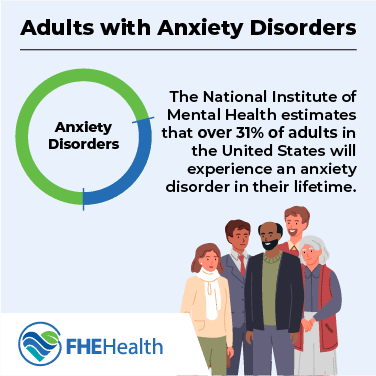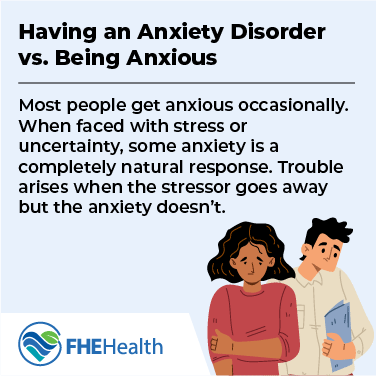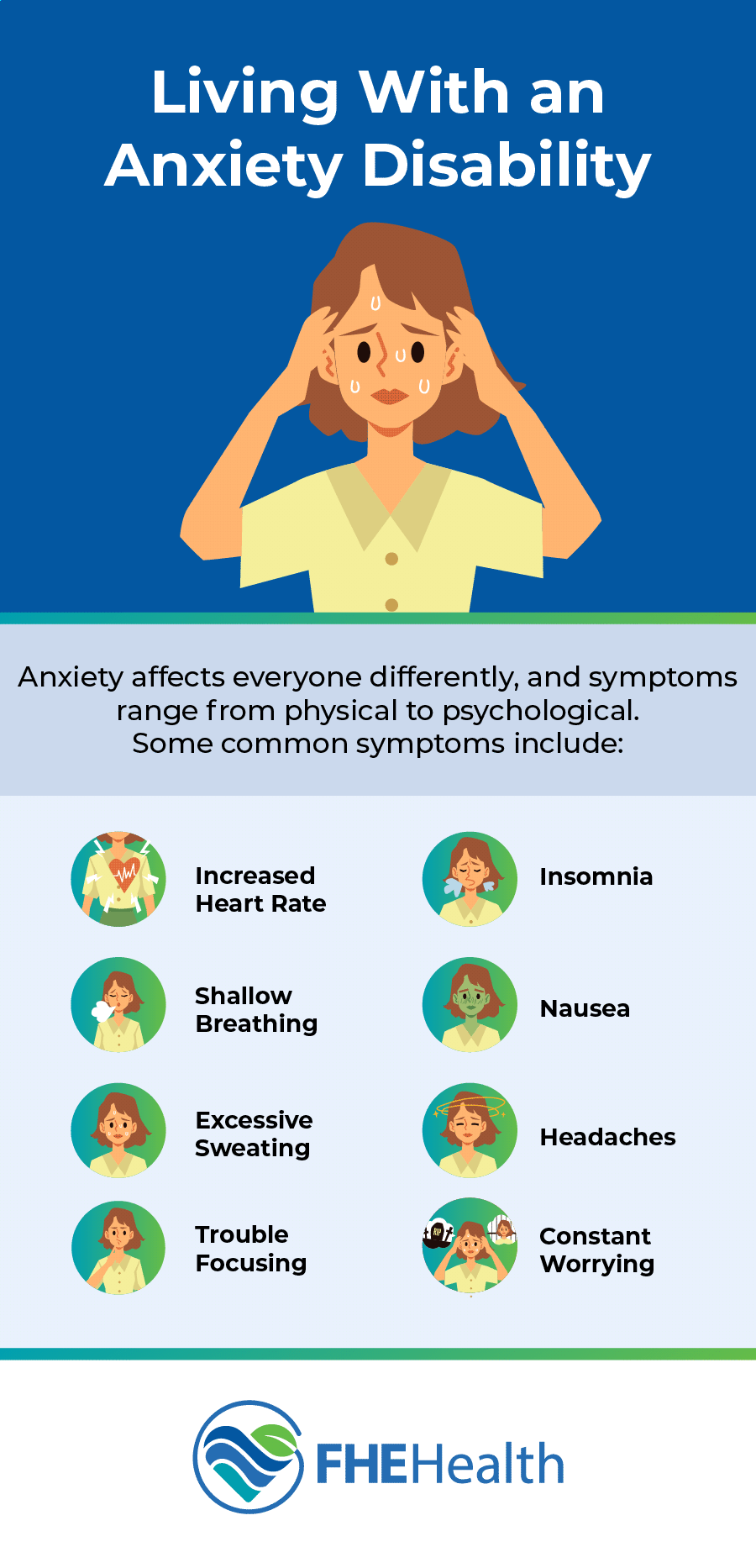
Anxiety disorders are characterized by excessive, disruptive and uncontrollable worry and fear over day-to-day situations. Affecting nearly a fifth of the population, these disorders represent the most common mental illnesses in the United States, with about 23 percent of females and 14 percent of males meeting the criteria for an anxiety disorder diagnosis.
In a legal context, a disability is defined as a physical or mental impairment that affects one or more major life activities. For many people living with anxiety disorders, the characteristics of the condition make it particularly challenging to accomplish everyday work tasks.
In this article, we delve into information on how anxiety affects daily life, including work-related responsibilities and the rights and protections the law provides those with mental illnesses. We also outline some helpful tips for navigating the system and connecting with local resources.
Understanding Anxiety Disorders
Life with an anxiety disability is a constant struggle. Anxiety turns tasks and interactions into sources of severe mental and physical anguish despite how simple they may seem. From unexpected triggers to unhealthy coping mechanisms, this condition can seep into all areas of your life if left unchecked. 
Types of Anxiety Disorders
There are several types of anxiety disorders, each with their own symptoms and challenges. These include:
- Generalized Anxiety Disorder: GAD is a type of disorder that causes individuals to feel excessive worry or nervousness about everyday activities and scenarios
- Panic Disorder: This anxiety disorder is characterized by recurrent and unexpected panic attacks
- Social Anxiety Disorder: Those with this anxiety disorder experience intense fear of social situations, which often leads to avoidance
- Specific Phobias: This form of anxiety is associated with extreme fear related to specific situations or objects; some common phobias include blood, insects, weather events or riding in an airplane
Symptoms and Impact
Anxiety affects everyone differently, and symptoms range from physical to psychological. Some common symptoms include:
- Increased heart rate
- Insomnia
- Shallow breathing
- Nausea
- Excessive sweating
- Headaches
- Trouble focusing
- Constant worrying
Anxiety can also trigger panic attacks, periods of intense fear that cause severe physical effects. Those with anxiety often have trouble completing basic tasks due to perceived threats — no matter how irrational these threats may seem.
The Difference Between Having an Anxiety Disorder vs. Being Anxious
 It’s easy to confuse being anxious with having an anxiety disorder. But the truth is, most people get anxious occasionally. When faced with stress or uncertainty, some anxiety is a completely natural response. Trouble arises when the stressor goes away, but the anxiety doesn’t.
It’s easy to confuse being anxious with having an anxiety disorder. But the truth is, most people get anxious occasionally. When faced with stress or uncertainty, some anxiety is a completely natural response. Trouble arises when the stressor goes away, but the anxiety doesn’t.
Anxiety disabilities can take several forms, including:
- Generalized anxiety disorder
- Social anxiety
- Agoraphobia
- Separation anxiety
The National Institute of Mental Health estimates that over 31 percent of adults in the United States will experience an anxiety disorder in their lifetime. This percentage is similar across groups regardless of age and gender — anxiety can truly affect anyone. However, even those who experience anxiety frequently may not have an anxiety disorder.
There are a few characteristics that set anxiety disorders apart from a natural anxiety response. The first is that the anxiety is disproportionate to the situation. Experiencing extreme physiological distress over a minor task that most people would complete without a second thought may indicate you have an anxiety disorder. On the other hand, having severe anxiety in the face of a life-altering situation is a proportional response.
Additionally, an anxiety disorder will prevent you from functioning normally. If you experience natural anxiety, you’ll still be able to maintain relationships, keep up with work and even enjoy hobbies. Those with an anxiety disorder can often find it nearly impossible to get out of bed.
Finally, an anxiety disorder is constant. Even when there’s nothing to stress over, you’ll be unable to prevent worrying and having anxious thoughts. You’ll also spend much of your time trying to avoid triggers.
What’s It Like Living With an Anxiety Disability?
With an anxiety disability, you may be unable to focus on responsibilities for work or school, even with a tight deadline. You might also struggle to maintain intimate relationships or make decisions. Living in constant fear of an anxiety trigger can lead to high stress levels, which have repercussions of their own.
No two people experience anxiety exactly the same way. Whether it feels like drowning in a wave of fear or being trapped on a never-ending roller coaster, an anxiety disability can inflict serious damage on your life over time.
The Legal Definition of Disability
Understanding the legal definition of disability is essential for those seeking protection under federal law.
Overview of Disability Law
In recent decades, the U.S. government has taken steps to ensure equal access to resources and opportunities for those with disabilities. In 1973, the government passed the Rehabilitation Act, which made provision for equal access to education and employment for those with disabilities.
Recognizing that mental conditions can be just as damaging as physical ones, the U.S. government passed the Americans with Disabilities Act Amendment Act in 2008. This expanded the definition of a disability to include various psychological disorders. This law promotes accessibility and fairness for those with disabilities in five aspects of life, including employment.
Criteria for Disability Determination
The criteria for disability determination include several essential factors, such as:
- Substantial Limitation of Major Life Activities: This refers to significant difficulties with completing basic activities, including self-care, walking, driving, eating, hearing, seeing, speaking and learning.
- Duration and Severity of Condition: To qualify for legal protections, the individual’s condition must be severe and long-term, lasting at least one year.
- Individual Assessment: Each case is evaluated individually and on its own merit based on the worker’s age, job experience, education and ability to complete daily activities.
These criteria ensure that protections are available to those who truly need them.
Protections Under the Law
The Americans with Disabilities Act (ADA) recognizes anxiety disorders as potential disabilities. If your anxiety is severe enough to be considered a disorder, it likely meets the legal criteria for a disability, entitling you to certain protections. To claim disability status, you must be able to prove your anxiety disorder limits your life in a substantial way. For psychological disorders, evidence of a condition’s effect on you can usually be provided by a medical professional.
Rights Afforded to Individuals with Anxiety
Those living with diagnosed anxiety disorders have rights and protections in the workplace that enable them to fulfill their job responsibilities. First, they’re entitled to reasonable accommodations that don’t interfere with their duties. In the workplace, increased flexibility is a common arrangement. Working from home may ease your symptoms, or you may be more efficient working part-time instead of a full work week. Some people benefit from additional leave time, whether it’s used for a mental health day or a therapy appointment. Even extra break time can make a big difference in the event of a trigger or anxiety attack.
Second, workers with anxiety are legally protected against discrimination. This means an employer can’t fire, demote or refuse to hire someone because of their anxiety disorder.
Finally, workers diagnosed with anxiety disorders are entitled to support services to help them effectively manage their job duties. Depending on the employer, this may include services such as:
- Counseling and therapy services
- Employee Assistance Programs
- Stress management programs, including workshops and resources
- Support groups
- Medical leave for therapy
Employer Responsibilities
When a worker has a condition such as an anxiety disorder, their employer has certain responsibilities related to ensuring they can perform their job duties. These include understanding what accommodations they may be legally required to provide and engaging the worker in the process of determining accommodations.
Navigating the System
While navigating the workplace can be especially difficult for those living with anxiety disorders, understanding your legal protections and rights can help you access the support you need to succeed at your job.
Applying for Disability Benefits
Depending on the severity of your condition, you may qualify for Social Security benefits. The SSA’s Blue Book outlines specific criteria for anxiety disorders, helping you determine whether you qualify for programs such as Ticket to Work. It’s important to collect and submit medical evidence to support your case, including medical records, doctor’s notes and any documentation that shows the impact your disability has on your daily life. It may also be a good idea to work with a disability attorney who can help you navigate the application process.
Workplace Considerations
Many employers want to support their workers who have disabilities such as anxiety disorders, and open communication is key to understanding needs and planning for necessary accommodations.
Before talking to your employer, prepare by gathering supporting documents from your healthcare provider that outline your diagnosis and suggest reasonable accommodations that could help you fulfill your job duties. Schedule a private meeting with your supervisor or HR representative, and explain how your disorder has affected your work. Request specific accommodations that could help, and be open to feedback and alternative suggestions.
Many workplaces have Employee Assistance Programs that help workers manage personal and work-related challenges. These programs often feature a range of services, such as legal consultation, confidential counseling and health and wellness programs, supporting workers with conditions such as anxiety disorders.
Mental Health Support and Resources
Living with an anxiety disorder isn’t easy, but you don’t have to navigate your condition alone. Through professional help and community resources, you can find support, practical advice, and tools that will assist you in advocating for yourself.
Professional Help
Professional therapy is at the foundation of effective treatment for anxiety disorders. There are several types of counseling available, including cognitive behavioral, exposure and dialectical behavioral therapies. Talk to a trusted mental health care provider about these options to find one that fits your needs and goals.
Along with attending professional counseling, many people living with anxiety disorders rely on medication to manage their symptoms. Selective serotonin reuptake inhibitors are a popular option for long-term management, while benzodiazepines provide short-term relief. It’s important to work with a doctor to determine the best medication for your needs.
Online Resources and Hotlines
As information on the prevalence of mental illnesses has become more available, we’ve had greater access to online resources and hotlines that provide support and practical guidance. These include:
- National Alliance on Mental Illness: NAMI offers informational and educational resources and operates a helpline
- Anxiety and Depression Association of America: ADAA publishes sound advice on navigating life with an anxiety disorder
- 988: This lifeline provides immediate help during a panic attack and provides judgment-free support for mental health
Navigating Anxiety in the Workplace
Anxiety disorders can make it difficult to navigate everyday life, especially when it comes to fulfilling job duties. Fortunately, there are legal protections for employees diagnosed with anxiety disorders, as well as a wealth of resources that can help them reach their career goals.
Even with ADA protection, an anxiety disorder is life-altering. At FHE Health, we’re ready to help you get the treatment you need to improve your quality of life. Contact us at FHE today to take the first step.






